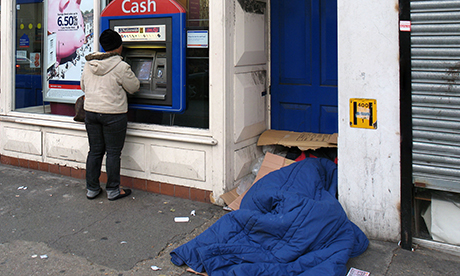Homelessness costs double in five years as council struggles to meet demand

On the streets: homelessness spend has doubled over the past five years. Photograph: Alan Stanton (Creative Commons)
Costs of homelessness in Hackney have doubled in just five years, new figures show.
Data released by Hackney Council under the Freedom of Information Act reveals a sharp increase in the spend on homelessness services from £3.1m in 2009-10 to £7.2m in 2014-15.
According to homelessness charity Crisis, 112,330 households applied to their local authority for homelessness assistance in 2014-15, a 26 per cent rise since 2009.
But Hackney Council, like many other boroughs, is struggling to find the resources to meet the urgent demand for temporary accommodation.
The figures reveal that the cost of temporary accommodation dramatically outstrips income the council receives in housing benefit and subsidies from central government. In 2014-15, Hackney Council was forced to find £3.5m in order to plug the gap.
Kevin Garvey, policy officer at homelessness charity Shelter said that in the face of soaring housing costs and slashes to welfare support the figures came “as little surprise”.
“A severe drought of affordable homes and drastic cuts to council budgets are making it much harder for local councils to help homeless families find anywhere that’s stable and affordable to live,” he added.
Hackney Green Party, which submitted the FoI to Hackney Council blamed the rocketing costs on welfare reform and cuts to benefits, brought in by the Coalition and Conservative governments.
Spike in annexe spend
The data also reveals that of the council’s total spend on temporary accommodation last year, 42 per cent was spent renting annexes – usually self-contained units with one room.
Hostels were the second most common accommodation type at 37 per cent. Renting in the private sector made up 17 per cent of the borough’s spend with B&B accommodation at 4 per cent.
Councillor Phillip Glanville, Hackney Council’s Cabinet Member for Housing, said: “The housing crisis and welfare reform are impacting on the lives of residents, as well as on the council’s finances.
Cllr Glanville said the council was responding by building council homes, improving its existing stock and campaigning to support the private rental sector.
The Department for Communities and Local Government (DCLG) has been approached for comment.
